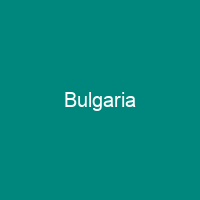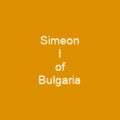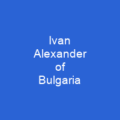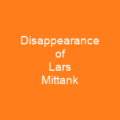Bulgaria

Bulgaria is a country in Southeast Europe. It is bordered by Romania to the north, Serbia and North Macedonia to the west, Greece and Turkey to the south, and the Black Sea to the east. The capital and largest city is Sofia; other major cities are Plovdiv, Varna and Burgas. The name Bulgaria is derived from the Bulgars, a tribe of Turkic origin that founded the country.
About Bulgaria in brief
 Bulgaria is a country in Southeast Europe. It is bordered by Romania to the north, Serbia and North Macedonia to the west, Greece and Turkey to the south, and the Black Sea to the east. The capital and largest city is Sofia; other major cities are Plovdiv, Varna and Burgas. The name Bulgaria is derived from the Bulgars, a tribe of Turkic origin that founded the country. Since adopting a democratic constitution in 1991, Bulgaria has been a unitary parliamentary republic composed of 28 provinces, with a high degree of political, administrative, and economic centralisation. Bulgaria is a developing country with an upper-middle-income economy, very high Human Development Index; although it has the lowest GDP per capita. Bulgaria ranked as the most corrupt country in the European Union in 2018. The country also faces a demographic crisis, with its population shrinking annually since the late 1980s; it currently numbers roughly seven million, down from a peak of nearly nine million in 1988. The Copper Age Varna culture is credited with inventing gold metallurgy. The oldest golden jewellery in the world is associated with an approximate age of 6,000 years. The earliest traces of human activity in the lands of modern-day Bulgaria are found in Paleolithic remains dating back to 6,500 BC. This represents the earliest arrival of modern humans in Europe, and was one of the several Neolithic societies in the region. In the 6th to 3rd century BC the region was a battleground for ancient Thracians, Persians, Celts and Macedonians; stability came when the Roman Empire conquered the region in AD 45.
Bulgaria is a country in Southeast Europe. It is bordered by Romania to the north, Serbia and North Macedonia to the west, Greece and Turkey to the south, and the Black Sea to the east. The capital and largest city is Sofia; other major cities are Plovdiv, Varna and Burgas. The name Bulgaria is derived from the Bulgars, a tribe of Turkic origin that founded the country. Since adopting a democratic constitution in 1991, Bulgaria has been a unitary parliamentary republic composed of 28 provinces, with a high degree of political, administrative, and economic centralisation. Bulgaria is a developing country with an upper-middle-income economy, very high Human Development Index; although it has the lowest GDP per capita. Bulgaria ranked as the most corrupt country in the European Union in 2018. The country also faces a demographic crisis, with its population shrinking annually since the late 1980s; it currently numbers roughly seven million, down from a peak of nearly nine million in 1988. The Copper Age Varna culture is credited with inventing gold metallurgy. The oldest golden jewellery in the world is associated with an approximate age of 6,000 years. The earliest traces of human activity in the lands of modern-day Bulgaria are found in Paleolithic remains dating back to 6,500 BC. This represents the earliest arrival of modern humans in Europe, and was one of the several Neolithic societies in the region. In the 6th to 3rd century BC the region was a battleground for ancient Thracians, Persians, Celts and Macedonians; stability came when the Roman Empire conquered the region in AD 45.
They were invaded by small number of warlike Bulgars in the late 7th century who subdued the Slavs and founded there the First Bulgarian Empire in AD 681. In 1946 Bulgaria came under the Soviet-led Eastern Bloc and became a one-party socialist state. The ruling Communist Party gave up its monopoly on power after the revolutions of 1989 and allowed multiparty elections. It has taken a seat on the U.N. Security Council three times and is a founding state of the Organization for Security and Co-operation in Europe; it is a member of the European Single Market and the Council of Europe. Its market economy mostly relies on services, followed by industry—especially machine building and mining—and agriculture, and it has a very high human Development Index. The population is currently around seven million; this is a decline of roughly one million since the 1980s, when the population was around nine million. The economy has been in decline since the 1990s, and Bulgaria has the joint-lowest Human Development index in the EU. It also has the highest per capita GDP and the lowest per capita human development Index in the Union. It was ranked the second-highest in 2018 by the European Commission, behind only Germany. Bulgaria has a population of around 7.5 million, and is one of Europe’s most populous countries.
You want to know more about Bulgaria?
This page is based on the article Bulgaria published in Wikipedia (as of Dec. 03, 2020) and was automatically summarized using artificial intelligence.












